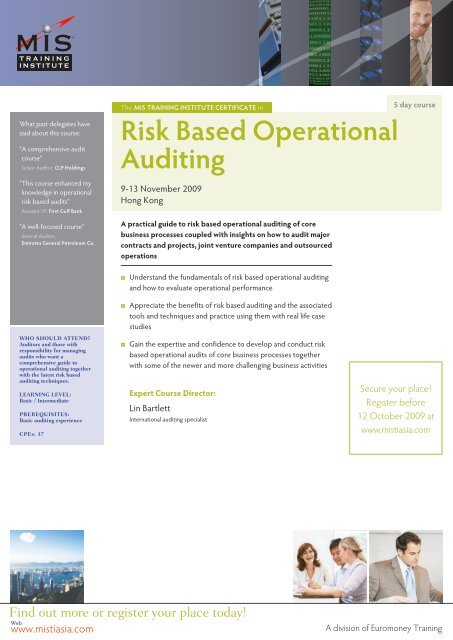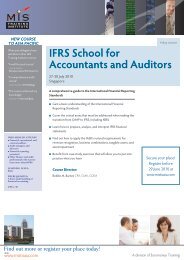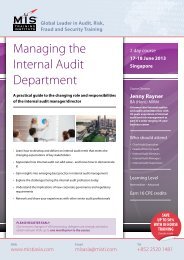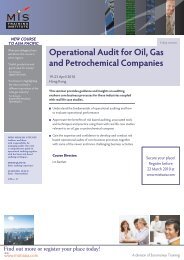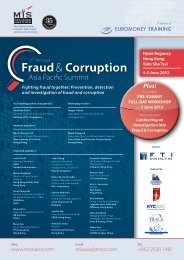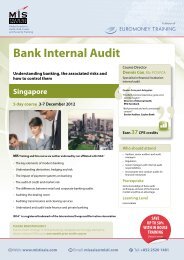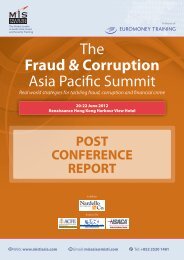Risk Based Operational Auditing - MIS Training - Asia
Risk Based Operational Auditing - MIS Training - Asia
Risk Based Operational Auditing - MIS Training - Asia
Create successful ePaper yourself
Turn your PDF publications into a flip-book with our unique Google optimized e-Paper software.
What past delegates have<br />
said about this course:<br />
“A comprehensive audit<br />
course”<br />
Senior Auditor, CLP Holdings<br />
“This course enhanced my<br />
knowledge in operational<br />
risk based audits”<br />
Assistant VP, First Gulf Bank<br />
“A well-focused course”<br />
Internal Auditor,<br />
Emirates General Petroleum Co.<br />
The <strong>MIS</strong> TRAINING INSTITUTE CERTIFICATE in<br />
<strong>Risk</strong> <strong>Based</strong> <strong>Operational</strong><br />
<strong>Auditing</strong><br />
9-13 November 2009<br />
Hong Kong<br />
A practical guide to risk based operational auditing of core<br />
business processes coupled with insights on how to audit major<br />
contracts and projects, joint venture companies and outsourced<br />
operations<br />
5 day course<br />
WHO SHOULD ATTEND<br />
Auditors and those with<br />
responsibility for managing<br />
audits who want a<br />
comprehensive guide to<br />
operational auditing together<br />
with the latest risk based<br />
auditing techniques.<br />
LEARNING LEVEL:<br />
Basic / Intermediate<br />
PREREQUISITES:<br />
Basic auditing experience<br />
CPEs: 37<br />
Understand the fundamentals of risk based operational auditing<br />
and how to evaluate operational performance<br />
Appreciate the benefits of risk based auditing and the associated<br />
tools and techniques and practice using them with real life case<br />
studies<br />
Gain the expertise and confidence to develop and conduct risk<br />
based operational audits of core business processes together<br />
with some of the newer and more challenging business activities<br />
Expert Course Director:<br />
Lin Bartlett<br />
International auditing specialist<br />
Secure your place!<br />
Register before<br />
12 October 2009 at<br />
www.mistiasia.com<br />
Find out more or register your place today!<br />
Web<br />
www.mistiasia.com<br />
A division of Euromoney <strong>Training</strong>
<strong>Risk</strong> <strong>Based</strong> <strong>Operational</strong> <strong>Auditing</strong><br />
9-13 November 2009, Hong Kong<br />
FOCUS AND FEATURES<br />
This five-day course provides<br />
practical and valuable guidance<br />
on risk based operational auditing<br />
and leading edge techniques in<br />
auditing. It teaches participants<br />
how to identify and prioritise the<br />
risks and assess the efficiency,<br />
effectiveness and economics of<br />
both core and non-core business<br />
processes. Practical exercises help<br />
delegates gain confidence in the<br />
techniques presented and in their<br />
own ability to use them.<br />
<strong>Auditing</strong> non-core activities can<br />
be difficult because the risks to<br />
business objectives are less well<br />
known to the business and to the<br />
internal auditors. Joint ventures,<br />
major contracts and projects and<br />
outsourced operations are all<br />
examined in detail. Key areas to<br />
focus on will also be highlighted<br />
to ensure that key risks are being<br />
managed.<br />
Delegates have the opportunity<br />
to practice risk identification in<br />
workshops. They will also review<br />
the challenges for internal audit in<br />
its approach to, and involvement<br />
with, risk management. The role<br />
of internal audit in facilitating<br />
risk management within the<br />
organisations, will also be<br />
discussed.<br />
Participants will learn the<br />
benefits that risk based auditing<br />
can have in focusing auditing<br />
effort on key risks and how to<br />
reflect and prioritise risk in their<br />
audit reports. Both aspects of<br />
risk–threats and opportunities–are<br />
covered.<br />
METHODOLOGY<br />
Through participating in<br />
discussions and case studies of real<br />
life examples, delegates will gain<br />
the knowledge and confidence to<br />
use the latest risk based auditing<br />
techniques to audit both the core<br />
business processes together with<br />
some of the more demanding noncore<br />
areas.<br />
<br />
<br />
<br />
<br />
<br />
<br />
<br />
<br />
<br />
<br />
<br />
<br />
<br />
<br />
<br />
<br />
<br />
<br />
Day 1<br />
Registration commences at 8:30<br />
Programme runs from 9:00 - 5:00 daily<br />
Setting the scene – internal auditing today<br />
Understanding the importance of Enterprise <strong>Risk</strong><br />
Management (ERM)<br />
Learning from recent high profile scandals<br />
The impact of Sarbanes-Oxley legislation<br />
Leading edge trends and top priorities for internal audit<br />
Identifying the overall assurance framework<br />
Managing the 360 degree perspective of risks and<br />
opportunities (reputation, social and ethical risks)<br />
Exercise: identifying where internal audit is positioned<br />
in your company<br />
What do we mean by risk management and risk<br />
based auditing<br />
Understanding risk management terminology and the key<br />
system elements<br />
Introducting the principles of risk based internal auditing<br />
Recognising the differences between a systems based audit<br />
and a risk based audit<br />
IIA guidance and direction<br />
The risk maturity framework<br />
Case studies<br />
– example risk evaluation process<br />
– example risk registers<br />
– example risk and control matrix for SOX compliance<br />
Exercise: recognising risk maturity<br />
The fundamentals of operational auditing<br />
<strong>Operational</strong> auditing defined<br />
Understanding the differences between operational and<br />
traditional auditing<br />
The 6 “E”s efficiency, effectiveness, economics, equity, ethics<br />
and the environment<br />
Day 2<br />
<strong>Auditing</strong> the procurement function<br />
Identifying the core purchasing activities and control<br />
objectives<br />
Evaluating and translating the key business risks into the<br />
audit programme and testing schedule<br />
The importance of segregation of duties controls<br />
Assessing the policies and procedures<br />
<br />
<br />
<br />
<br />
<br />
<br />
<br />
<br />
<br />
<br />
<br />
<br />
<br />
<br />
<br />
<br />
<br />
<br />
<br />
Evaluating supplier management<br />
Effective inventory management<br />
Case study: sustainable development principles and<br />
procurement policy<br />
Case study: e-procurement<br />
Exercises<br />
– Brainstorming risks – identifying the key risks in the<br />
requisition to payment process<br />
– Segregation of duties<br />
<strong>Auditing</strong> major contracts<br />
Understanding the different types of contract and audits<br />
required<br />
Differentiating between the various key stages of the contract<br />
life cycle<br />
Reviewing generic contract management risks<br />
Contract fraud – areas to audit<br />
Exercise: brainstorming contract threats and<br />
opportunities<br />
Case study: contract fraud<br />
Fraud awareness<br />
Identifying internal audit’s role<br />
Why fraud happens<br />
Profiling the fraudster<br />
High-potential areas for fraud occurrence<br />
Indicators of potential fraud – red flags<br />
Techniques for preventing fraud<br />
Using the computer to detect fraud<br />
Day 3<br />
<strong>Auditing</strong> sales and marketing<br />
Why sales and marketing is often difficult to audit<br />
Identifying the risks to the achievement of marketing<br />
objectives and targets<br />
Assessing advertising and promotions<br />
Order processing<br />
Pricing and discount policies<br />
Sales management and performance monitoring<br />
Exercises<br />
– marketing risk brainstorm<br />
– reviewing risks in the sales to receivables process<br />
– segregation of duties<br />
– auditing product development<br />
Biography<br />
Lin Bartlett<br />
International auditing specialist<br />
Lin Bartlett is a director of an independent<br />
management consultancy established in 2000<br />
specialising in training, risk management,<br />
corporate governance, business controls<br />
and auditing of financial and non-financial<br />
reporting, corporate social responsibility<br />
and interim finance management. During<br />
her career with Shell, Lin held a number of<br />
Find out more or register your place today!<br />
Web<br />
www.mistiasia.com<br />
senior management roles in IT, Finance and<br />
Audit and more recently has been engaged<br />
on Sarbanes-Oxley compliance projects and<br />
conducting External Quality Assessments as<br />
required by the IIA. Lin is a Senior Instructor<br />
for <strong>MIS</strong> and develops and delivers both<br />
external and inhouse training courses on <strong>Risk</strong><br />
Management, <strong>Auditing</strong>, Communications,<br />
Project Management and Sarbanes-Oxley<br />
Compliance. She is also a member of the <strong>MIS</strong><br />
Internal Audit Advisory Board.
Day 5<br />
<strong>Auditing</strong> the Human Resources (HR) function<br />
<strong>Auditing</strong> projects<br />
<br />
<br />
<br />
<br />
<br />
<br />
Current issues for the HR profession<br />
Identification of the core HR objectives and targets<br />
Brainstorming the risks and evaluating the responses<br />
Employee recruitment, terminations and appraisals<br />
Management of employee compensation and benefits<br />
administration<br />
Evaluating HR effectiveness and performance monitoring<br />
<br />
<br />
<br />
<br />
<br />
<br />
What constitutes a project<br />
Why does internal audit get involved<br />
Recognising the different stages of a project<br />
Determining the key stakeholders, project governance<br />
framework and key performance indicators<br />
Assessing project management, monitoring and control<br />
Identifying project key risks and opportunities<br />
Case studies: the balanced scorecard<br />
Exercise: developing audit terms of reference for a risk<br />
based operational audit of the recruitment process<br />
Exercises<br />
– recognising the differences in roles between the<br />
consultant and the auditor<br />
– developing a test plan for a project audit case study<br />
<br />
<br />
<br />
<br />
<br />
<br />
<br />
<br />
<br />
<br />
<br />
<br />
Day 4<br />
<strong>Auditing</strong> the finance functions<br />
Assessing the key risks in the finance function<br />
Finance and accounting control objectives<br />
<strong>Auditing</strong> the core activities of accounts payable, receivable and<br />
sales accounting activities<br />
Key risks in payroll and treasury<br />
Evaluating the effectiveness of the finance and accounting<br />
functions<br />
Exercises<br />
– Identifying and evaluating potential risks in the<br />
payroll process<br />
– Planning a treasury audit<br />
Handout – specialist area definitions: investment<br />
management, capital expenditure, cash and banking, debt and<br />
interest rate exposure, risk and insurance management and<br />
pension fund management<br />
<strong>Auditing</strong> governance and ethics<br />
Understanding the importance of the corporate culture<br />
Identifying the ethics and governance framework and key risks<br />
Assessing alignment with organisational values and goals<br />
Evaluating management performance and effectiveness<br />
Evaluating the effectiveness of the organisation’s ERM<br />
Managing sensitivities and reporting<br />
Exercises<br />
– auditing ethics and compliance<br />
– ethical dilemmas<br />
<br />
<br />
<br />
<br />
<br />
<br />
<br />
<br />
<br />
<br />
<br />
<br />
<br />
<strong>Auditing</strong> joint ventures<br />
Exploring the change in position from an internal auditor to<br />
that of an external auditor and the different challenges the<br />
change in role presents<br />
Understanding the different types of joint ventures<br />
agreements and types of audit that may be required<br />
Establishing communications and determining the specific<br />
contractual arrangements<br />
Identifying sources of information and any potential JV and<br />
audit sensitivities<br />
Confirming the corporate governance and operational<br />
framework and standards<br />
Identifying opportunities to review the JV assurance<br />
framework and to place reliance on the work of others<br />
Confirming the issue escalation process to be followed<br />
Exercise: developing a risk assessment matrix for a joint<br />
venture company<br />
<strong>Auditing</strong> outsourced operations<br />
The broadening scope of outsourced activities<br />
The decision to outsource and strategic implications<br />
The importance of contractual arrangements and performance<br />
measurements<br />
The implications of Sarbanes-Oxley and SAS 70s<br />
Evaluating the key risks<br />
Managing the audit protocols and any sensitivities<br />
Exercise<br />
– auditing an outsourced operation<br />
– developing the terms of reference<br />
– developing the risk matrix and reporting the findings<br />
Audit review and closure<br />
© Copyright Euromoney <strong>Training</strong> 2009<br />
SAVE TIME AND MONEY WITH IN-HOUSE TRAINING<br />
<strong>MIS</strong> <strong>Training</strong> Institute provides specific, tailor-made in-house<br />
training on a wide variety of internal audit, IT audit and<br />
information security topics. Clients are able to determine the<br />
content, duration, and level of expertise of the course, creating a<br />
unique and customised programme. All our in-house consultants<br />
are professional trainers and draw on many years of practical<br />
experience in the audit and information security area.<br />
To find out more about the special benefits of in-house training,<br />
please contact:<br />
Esther Chan, Division Manager, <strong>Asia</strong> Pacific<br />
Tel: +852 2111 6634<br />
Email: esther.chan@euromoneyasia.com<br />
Book by 12 October 2009 to secure your place.<br />
Email Telephone Facsimile<br />
misasia@misti.com +852 2520 1481 +852 2866 7340
I prefer course updates by email.<br />
My email address is .<br />
Please fax back to +852 2866 7340 or email your details to update@euromoneyasia.com.<br />
Please include the code that appears on top of the address label above in your email.<br />
VENUE<br />
All of our courses are held in<br />
4 – 5 star hotels, chosen for<br />
their location, facilities and<br />
level of service. You can be<br />
assured of a comfortable,<br />
convenient learning environment<br />
throughout the duration of the<br />
course. Due to the variation in<br />
delegate numbers, we will send<br />
confirmation of the venue to you<br />
approximately 2 weeks before the<br />
start of the course.<br />
5 easy ways to register<br />
Please quote reference WEB<br />
1. Web<br />
www.mistiasia.com<br />
2. Email<br />
misasia@misti.com<br />
3. Telephone<br />
+852 2520 1481<br />
4. Facsimile<br />
+852 2866 7340<br />
5. Mail<br />
GPO Box 11886, Hong Kong<br />
ABOUT US<br />
Founded in 1978, <strong>MIS</strong> <strong>Training</strong><br />
Institute is the international<br />
leader in audit and information<br />
security training, with offices<br />
in <strong>Asia</strong>, the UK and USA. <strong>MIS</strong>’<br />
expertise draws on experience<br />
gained in training more than<br />
200,000 delegates across five<br />
continents. <strong>MIS</strong> <strong>Training</strong> Institute<br />
is a division of Euromoney<br />
<strong>Training</strong>, which provides practical<br />
skills based training to the finance<br />
and legal community. <strong>MIS</strong><br />
<strong>Training</strong> Institute and Euromoney<br />
<strong>Training</strong> are divisions of<br />
Euromoney Institutional Investor<br />
PLC, a leading international<br />
business-to-business global media<br />
group.<br />
Also from <strong>MIS</strong> <strong>Training</strong> Institute<br />
- visit our website for the full<br />
schedule<br />
<strong>Auditing</strong> the Treasury<br />
Function<br />
<strong>Risk</strong> <strong>Based</strong> Internal <strong>Auditing</strong><br />
<strong>Auditing</strong> the Enterprise <strong>Risk</strong><br />
Management Process<br />
Combating IT Fraud<br />
Registration form<br />
Yes, please register me for <strong>Risk</strong> <strong>Based</strong> <strong>Operational</strong> <strong>Auditing</strong> (MH4393)<br />
on 9-13 November 2009, Hong Kong<br />
US$4,125/person<br />
Membership Discount<br />
IIA Hong Kong members save 15% ISACA Hong Kong members save 15%<br />
Other IIA members save 10% Other ISACA members save 10%<br />
This discount cannot be used in conjunction with any other offer.<br />
Team Discount<br />
If 3 or more delegates from the same company attend the same course date, the second and subsequent<br />
delegates will receive a 5% discount.<br />
Delegate details<br />
Surname<br />
First name<br />
Position<br />
Company<br />
Address<br />
Department<br />
Mr/Mrs/Ms<br />
Please note, payment must be received prior to course start.<br />
Payment details (please tick as appropriate)<br />
Cheque Invoice Credit card #<br />
#<br />
To make a payment by credit card, please call +852 2520 1481.<br />
Telephone<br />
Email<br />
Fax<br />
I have read and understood the booking terms and conditions<br />
Signature<br />
Date<br />
ISACA Membership No.:<br />
How did you hear about the course<br />
IIA Membership No.:<br />
Approving Manager<br />
Name<br />
Position<br />
Disclaimer<br />
<strong>MIS</strong> <strong>Training</strong> reserves the right to alter any<br />
part of the published programme or faculty.<br />
In the event of course cancellation by <strong>MIS</strong><br />
<strong>Training</strong> due to unforeseen circumstances,<br />
<strong>MIS</strong> <strong>Training</strong> limits its liabilities to refunding<br />
the tuition fee of the course.<br />
Fee includes tuition, documentation, lunch<br />
and refreshments. Delegates are responsible<br />
for their own flights and accommodation.<br />
An invoice will be sent upon receipt of<br />
registration form.<br />
A Euromoney Institutional Investor<br />
group company<br />
Data protection<br />
The information you provide will be<br />
safeguarded by the Euromoney Institutional<br />
Investor PLC whose subsidiaries may use it to<br />
keep you informed of relevant products and<br />
services. We occasionally allow reputable<br />
companies outside Euromoney Institutional<br />
Investor PLC to contact you with details of<br />
products that may be of interest to you. As an<br />
international group we may transfer your data<br />
on a global basis for the purposes indicated<br />
above. If you object to contact by telephone<br />
fax or email please tick the relevant box.<br />
If you do not want us to share your<br />
information with other reputable companies<br />
please tick this box<br />
Cancellation policy<br />
If any registered delegate cannot attend our<br />
course, a replacement is always welcome.<br />
Cancellations must be made in writing (letter<br />
or fax) with <strong>MIS</strong> <strong>Training</strong>’s acknowledgement.<br />
Written cancellations must reach this office<br />
30 days before the programme commences.<br />
A full refund less an administration charge<br />
of US$150 will be given. For any written<br />
cancellation requests that reach us less than<br />
30 days before the event, no refunds will be<br />
given. However, if you wish to attend another<br />
<strong>MIS</strong> <strong>Training</strong> course in the <strong>Asia</strong>-Pacific<br />
region, a 75% discount voucher which values<br />
not more than 75% of the initial payment will<br />
be issued. Please note that the subsequent<br />
course must take place within 1 year of the<br />
initial registration. Discount vouchers are<br />
transferable within the same organisation, but<br />
not to be used in conjunction with any other<br />
discount schemes. Discount vouchers will not<br />
be issued for no-shows without cancellation.<br />
<strong>MIS</strong> <strong>Training</strong> reserves the right to the final<br />
decision if any dispute arises.<br />
Incorrect mailing<br />
Please accept our apologies for mail which<br />
is incorrectly addressed. Should you wish to<br />
amend the address/ addressee details, please<br />
send or fax us a copy of the relevant mailing<br />
label (on the envelope or brochure) and we<br />
will update our records accordingly.<br />
© Copyright Euromoney <strong>Training</strong> 2009


